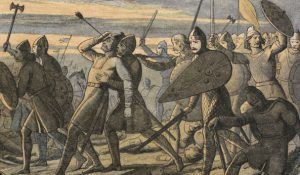by Gabrielle C. Durham
 When you consume a meal, do you eat cow or beef? Yes, these are the same, especially considering where they end up, but we tend to think of the cow as the beginning of this particular process, and the beef as the product. More of these pairings include calf/veal, swine or pig/pork, sheep/mutton, hen or chicken/poultry, deer/venison, snail/escargot.
When you consume a meal, do you eat cow or beef? Yes, these are the same, especially considering where they end up, but we tend to think of the cow as the beginning of this particular process, and the beef as the product. More of these pairings include calf/veal, swine or pig/pork, sheep/mutton, hen or chicken/poultry, deer/venison, snail/escargot.
The question: Why are the “baser” elements of Anglo-Saxon origin, similar to our curse words, whereas the results typically have French roots? As you rush to beat me to the answer with your pupil’s sycophancy, it’s all about the Battle of Hastings in 1066. When the Normans, aka the French, beat the snot out of the English, or Anglo-Saxons, French words started creeping into the language. The Norman words were considered more sophisticated (as in, poultry is fancier than hen).
This applies to other, more vegan-friendly options as well, such as beverages. In this case, sophistication may not be the goal, but pretension is the indubitable result.
Many of my kindred (editors) try to replace the Latinate or Romantic words with Anglo-Saxon words. Is it a linguistic form of nationalism? Not really, although I don’t read alt-right writing, so I could be wrong. The goal is to simplify text, reducing gratuitous verbiage where possible. Or cutting spare words. See how that works?
It’s not just about the meat and potatoes. Other Anglo-Saxon/French pairings include these:
thinking/pensive
hanging/pendant
kingly/regal
ask/enquire
bring/carry
smell/odor
buy/purchase
lawyer/attorney
answer/reply or respond
fall/autumn
weird/strange
folk/people
wish/desire
freedom/liberty
weak/feeble
brittle/fragile
wild/savage
tough/difficult
hopelessness/despair
lovely/beautiful
woodwork/carpentry
deathly/lethal or mortal
foe/enemy
hearty/cordial
house/mansion
green/verdant
snake/serpent
fire/flame
You could easily distinguish between words if you were in a hair-splitting mood. You are more likely to refer to a lawn as verdant than to a person’s eyes, and your heart’s wish sounds more innocent than the same organ’s desire. Essentially, though, the pairs are the same, or they were at some point.
Even curse words have more force when they are of Anglo-Saxon origins. Are you more likely to mutter, “Feces!” or “Copulation!” after a good toe stubbing? Probably not. In fact, as one cult leader points out, it feels inestimably good to drop an F-bomb from time to time.
Anglo-Saxon is an ancestor of English, as much as Latin is the progenitor of French and its Romance language brethren. English derives most directly from the West Germanic dialects that the Angles, Saxons, and assorted Teutonic tribes spoke in the fifth and sixth centuries. These dialects informed Old English, which then underwent another metamorphosis to Middle English after the Norman Invasion in 1066 when Anglo-French came on the scene. The Romantic Norman French served as the language of court, culture, bureaucracy, and upward mobility for a few centuries.
What is interesting to me is that Norman French was fairly dissimilar from Parisian French, or Francien. Earlier in its life, Norman French had many Norse words, which did not survive into Middle French. In England, the aristocracy typically spoke Norman French, while the rest of the population spoke English/Anglo-Saxon. (A third group, of clergy, spoke Latin.) As one might expect, the patricians viewed English as too low. Old English was spoken rather than written, which makes sense considering its practitioners. The languages grew together slowly through generations of intermarriage to evolve into Middle English. After the outbreak of the Black Death in 1349 and 1350, Norman French died out as Anglo-Saxon kept moving toward Middle English to gain prominence to become the national language of England.
Chaucer’s Canterbury Tales, begun in the 1380s, shows a language with many Norman French loanwords and also a slightly more stable, if goofy, orthography. His contemporary, John Wycliffe, produced the first Bible in English in the same decade, which was fairly daring for the time. Listen here (circa 1260) and here (from 1225) for songs in Middle English. Coincidentally or not, both are about weather.
There you have it: Norman French had jumped the shark, Anglo-Saxon had evolved, and Middle English had become the lingua franca of the land by the late Middle Ages. We and Middle English have so much to thank French for: what some might call an overreliance on butter, a fuller, meatier vocabulary, and an attitude that is snooty as copulation (AF).
